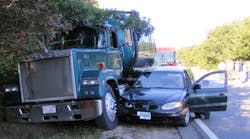Let’s say a driver parks his or her tractor-trailer for the night legally along the side of a road. Then, all of a sudden, BOOM! A car plows into their rig, causing extensive damage to both vehicles. The truck driver didn’t do anything, mind you; the fault’s all on the motorist.
Ah, but the trucker’s CSA [Compliance Safety Accountability] score is going to suffer nonetheless – maybe cause a few shippers to rethink doing business with him or her – even though they did nothing to cause this crash.Think that’s fair? Didn’t think so.
That’s one of the biggest problems with the CSA program as it now stands, according to a new report from the American Transportation Research Institute (ATRI) – how non-preventable crashes affect CSA Scores.
ATRI tapped into carrier crash records – mapped to the Motor Carrier Management Information System (MCMIS) database maintained by the Federal Motor Carriers Safety Administration (FMCSA) – to identify a small and what the group dubbed “non-controversial” subset of non-preventable crashes to see how they affect a carrier’s overall CSA score.
Here’s how ATRI defines “non-controversial” where these non-preventable crashes are concerned:
- Animal collision
- Other vehicle hits legally parked truck
- Other vehicle ran a stop light or stop sign and hit a truck
- The driver of the other vehicle was cited for driving under the influence (DUI)
- Truck-assisted suicide
The ATRI analysis then removed such crashes from the carrier’s record and then re-calculated the “Crash” indicator within CSA’s Behavior Analysis and Safety Improvement Category or “BASIC.”
End result? Among the more than one dozen carriers in ATRI's analysis, the crash Indicator BASIC dropped nearly 15% once it cut out the “non-preventable crash” data subset."The trucking industry has identified a number of flaws in FMCSA's calculation of carrier safety performance through the CSA BASICs and perhaps none is more egregious than the inclusion of non-preventable crashes in the Crash Indicator BASIC,” noted Scott Mugno, VP of safety and maintenance for FedEx Ground as well as a member of ATRI's research advisory committee, in a statement.
“This latest analysis, using a very conservative definition of non-preventable crashes, demonstrates just how skewed FMCSA's BASIC calculations can be," he added.
ATRI also estimated that such “non-preventable” crashes are extremely costly to trucking companies, totaling over $68 million for the 15 carriers used in this analysis effort.
“Many industry stakeholders have noted that not including a preventability determination in the BASIC formula may mislead conclusions about a carrier’s actual safety performance,” the group stressed in its study.
“For example, if a legally parked commercial motor vehicle (CMV) is struck by another vehicle and qualifies as a DOT-reportable crash, this negatively impacts a carrier’s Crash BASIC measure,” ATRI said. “Yet in this scenario, neither the driver of the CMV nor the carrier could have prevented the crash, yet the crash creates the misperception that the carrier is less safe.”
That’s why, despite Crash BASIC scores being restricted from public view, they can still impact carriers and drivers significantly, the group argued in its report. Potential areas of impact include:
- Economic harm: Shippers can, and often do, require the disclosure of Crash BASIC measurements and percentiles to assess the safety of a carrier. All other things being equal, carriers with a “bad” Crash BASIC score may be less likely to receive freight contracts than a “safer” carrier.
- Higher insurance costs: It is well understood that carrier BASIC scores are used as actuarial inputs for insurance risk assessments and determinations of premium levels.
- Legal consequences: Plaintiff attorneys may cite BASIC scores in legal proceedings, as an indicator of negligence and culpability.
- Lost productivity from more frequent inspections: The Inspection Selection System (ISS), a tool for selecting CMVs to inspect, is influenced by BASIC scores.
That’s why the influence that BASIC scores have on the productivity and viability of a carrier make it “paramount” in ATRI’s view for the measures to accurately reflect a carrier’s safety performance.
Will FMCSA and DOT be receptive to that argument? We’ll see.





